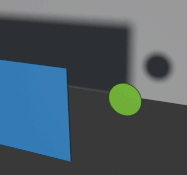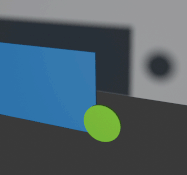According to Wikipedia, this effect is known as shadow blister effect. They have very nice animation which explains the phenomena using ray optics: Here's the link.
From the explanation:
The effect takes place when two objects are located at varying distances between a non-point light source and a backdrop upon which their shadows are cast. As the two objects move transversely such that their shadows approach each other, the object nearest the light source will begin blocking light from reaching the inside of the other object's penumbra, thereby expanding its umbra. This expansion of the further object's umbra will continue until the umbras of both objects meet.
I recommend just look at the animation it will really clear things up.


